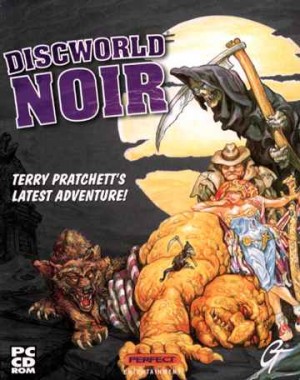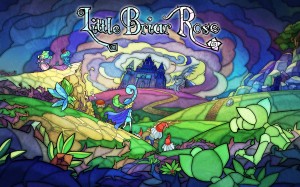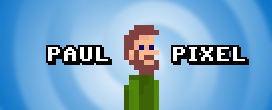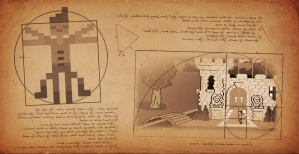Chris Bateman – Discworld Noir interview - page 1
A lot has been written about the adventure game crash of the late ‘90s. But whilst popular classics from that turbulent time period such as Grim Fandango and Gabriel Knight 3 continue to be celebrated with strong followings, most others have fallen into complete obscurity. Some of them pretty darn good games, too.
One such title hit the shelves in mid ‘99. It was Discworld Noir, a fantasy detective adventure and the third point-and-clicker to be set in Sir Terry Pratchett' popular Discworld universe.
Discworld Noir was a bold title to come out when it did – one which ultimately didn't pay off commercially. Unlike its colourful cartoon predecessors, it sported a dark and dreary presentation, and its pre-rendered textures arrived at a time when the 3D powerhouse Sega Dreamcast was just around the corner. And whilst other games were becoming increasingly more streamlined to appeal to the everyplayer, Noir did things its own way. It didn’t just set itself within the Discworld universe, but plunged neck-deep into it, explaining little to those unfamiliar with the book series, unabashedly doubling down on British humour, and downplaying the tried and tested item-based puzzle formula for a (then) relatively unique notebook / interrogation interface.
Oh, and the game's development company, Perfect Entertainment, was swamped in legal battles, whilst lack of funds from publisher GT Interactive – soon to be extinct themselves – resulted in near-zero promotion and ultimately no release in North America, period.
In hindsight, it never stood a chance, which only makes its existence all the more fascinating. Yes, Discworld Noir was (and in many ways still is) a unique game. I knew it the moment I first began playing, and 18 years on, it remains my favourite point-and-click adventure. So much do I adore it that I took it upon myself to contact the game’s writer and designer Chris Bateman to dig deeper through the ins and outs of this tragically overlooked game.
Chris remains a busy man with his own company now, but fortunately he was willing to spend time indulging a Discworld fan with the following insights.
Stefan Lubienski: Whilst we’re aware of Sir Terry’s involvement at the start and end of Noir, do you know if he ever played the finished Discworld games and, if so, what were his impressions?
Chris Bateman: Terry played all the Discworld games. He played the first two with his daughter Rhianna (now a successful writer in her own right), but he played Noir on his own. He was very happy with the finished game. There were a few wrinkles earlier in development, but we always fixed anything that he wasn't happy with. Discworld was his world, after all – we're all just visitors!
Stefan: It has at least been implied in the past that Pratchett was a bit prickly when it came to inventing new characters; hence why so many prominent characters from the books made up the cast in the first two games. However, most characters in Noir are original creations, presumably from yourself and the rest of the Perfect team.
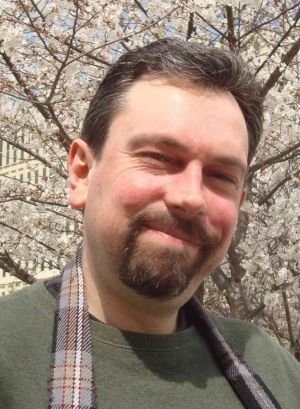 |
Chris Bateman shows off his spiffy $45 haircut |
Chris: Pretty sure every character in Noir that wasn't borrowed from the books (like Vimes, Gaspode, Death etc.) was invented by me. The one exception was Laredo Cronk, which was created by me at Terry's request. He loved Tomb Raider and wanted a Discworld pastiche of Lara, and I was happy to oblige! I had some fights with him about the names, but he had given me a broad licence to make a new cast for this one, owing to the concept being so original. I guess that makes me the only person other than Terry to have made Discworld characters... Hadn't really considered that before!
Stefan: Were there any characters, dialogues, or situations in the story that Pratchett ever objected to and, if so, why? Or, on the contrary, were there any that he quite liked?
Chris: There were some interesting disagreements, and some simple fixes that Terry requested. He was most concerned by the names, to be honest. The half-elf barkeep was originally named 'Legolam' (or some such) but he thought that was too close to the similar joke in Bored of the Rings, so he changed it to Mankin. He was not happy with Horst, and I had to argue quite strenuously that the name was geological (as all Discworld names are) and that it fit his role in the plot too. I might have overplayed my hand on that one, but Terry always took my foibles with gentle good humour.
Stefan: Conversely, was there anything Pratchett demanded MUST be included in any of the games?
Chris: Absolutely not! He was very supportive of our creative process. However, when he heard the voices for the Noir characters, he insisted that Vimes was all wrong so we had to get Rob Brydon back to re-record Vimes to sound like Gordon Jackson's character in The Professionals. I actually liked the original voice more – but hey, who knows how Discworld sounds if not Terry Pratchett?
Stefan: I’m particularly interested in his opinion of Lewton, if he had one. Personally, he is one of my favourite characters in any Discworld fiction, and I’m somewhat disappointed Pratchett never considered including him prominently in any future books.
Chris: It's a great honour to have Lewton praised like this, and I was really pleased with the character – and Rob Brydon's performance. But let's be frank: it was my character (with guidance from Gregg Barnett, who had the original idea for a film noir Discworld), and it was only through Terry's grace that he got to be a part of Discworld. I find it unthinkable that Terry would have incorporated anything from Noir into his core mythos, since his suite of characters was intimately connected with his writing. This isn't a situation like Star Trek, where multiple writers were contributing to storytelling – it really is quite astonishing that I got to contribute anything to Discworld, even peripherally. To put it another way, Discworld Noir is to Discworld what the Animated Series is to classic Trek – and there's no doubt in either case about what has precedence.
Stefan: There’s no question that what differentiates Noir from the previous titles is the darker visual style. Whilst I played the previous two games first, Noir immediately became a favourite for strongly resonating with the feel of the latter Discworld books, mainly those featuring Vimes and the Watch. How did you go about designing the locations? Obviously noir films were an influence, but were there any other factors given consideration?
Chris: For art design, I really have to heap praise on the incredible team of visual artists at Perfect Entertainment, and I include in this our out-of-house concept artist, Nick Martinelli, who was key to the process. Also, don't underestimate Gregg's involvement as director in guiding that process and getting the best work out of everyone – myself included.
As for the choices of location, well, a great many are straight from the books, of course – I read all the ones that were available during pre-production, and Terry and I had read a lot of the classic fantasy authors too, like Michael Moorcock and Fritz Leiber, whose city of Lankhmar was a huge influence on Ankh-Morpork.
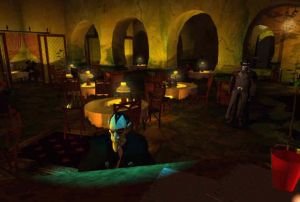 |
The film noir influences are immediately evident throughout Discworld Noir |
There was also, as you say, a mess of film noir influences (and a few Humphrey Bogart and Lauren Bacall flicks that weren't strictly noir). Beyond that, I also read a large chunk of Dashiell Hammett and Raymond Chandler novels to get to the heart of the hard-boiled detective genre. The Chandler books were brilliant in their own right, and The Big Sleep was a big influence on Noir (there's a Bogart and Bacall film too, but it's not a patch on the book). The Von Uberwald mansion, which is one of my few additions to Ankh-Morpork in the game, is a straight mash-up of The Big Sleep and the Discworld mythos. I got very comfortable reverse-engineering Terry's method. I couldn't match his prose, but the bricolage, the 'poons', the deep references – I worked hard to produce forgeries of Terry's way of adapting source materials into a fantasy world. I felt a bit like a hack artist copying a Da Vinci!
Stefan: Discworld Noir has a very unique design for the most part, made even more so now that pre-rendered graphics have gone very much out of fashion. There’s a slightly surreal aspect to the architecture and structures. Are you able to give any more details as to how much thought was put into each location?
Chris: Gregg, Nick, and the art team all the way! The one thing I'll say is that the artists each worked on one location at a time (with another set working on character animations), so they were really involved in getting the most out of each one. It was a painstaking process at times, but worth it. As for the pre-rendered graphics, Gregg had felt (correctly) that 2D was under commercial pressure following the success of the PlayStation, which brought real-time rendered 3D into the home. We simply couldn't make a good looking game in full 3D in the late ‘90s – imagine how ugly low-poly Noir would have been! – but Resident Evil showed how pre-rendered backgrounds could raise the bar for location design, and we followed them gladly down that path.
Stefan: Again, did you get any feedback from Mr. Pratchett on how Ankh-Morpork was to be represented?
Chris: I don't know if Gregg showed Nick's concept sketches to Terry, but I'll bet he did. It was too laborious a process to make changes after modelling and rendering.
Stefan: How did you go about designing the characters of Noir? Did you work in conjunction with artists who had worked on other Discworld media (i.e. the book cover illustrator)?
Chris: Josh Kirby? No, his only contribution was the box cover, which I have to say I didn't think was up to Josh's usually high standards. He died two years later, so perhaps he wasn't in the best of health...
Stefan: For all three games, how much freedom were you given in the design of the characters? I ask this as I assume this would have been an important detail for Sir Terry.
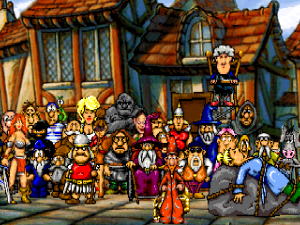 |
The first Discworld adventure drew almost entirely from Pratchett's existing cast of characters |
Chris: Well the first two draw almost entirely from the existing characters, and have the farcical tone of the early Discworld novels – which makes sense, given they star Rincewind, who is rather removed from the stage once the core cast (the Watch, on the one hand, and the Witches on the other) of Noir’s world is introduced, but I was given tremendous freedom with the story and characters – except, as already mentioned, for names, which were much more closely supervised.
Stefan: As much as I love Discworld Noir, even I must accept the fact that certain elements are a little rough around the edges. I think it’s safe to assume that, this not being a big budget title, concessions were probably made throughout production, particularly as the company was in the process of a court disagreement.
Chris: You are absolutely correct. We ran out of money, and we cut some corners. But we were far from the only point-and-click to have done so. No-one could suggest the final act of Broken Sword was anywhere near as polished as the first act, in Paris. Honestly, we should have scaled down the game at some point, and this had been proposed internally at Perfect... But it didn't happen that way. We'd have lost a lot from the game if we had.
Stefan: Do you remember any of the corners that had to be cut, or entire elements never included?
Chris: One sequence, just after Lewton has become a werewolf as he is befriended by Gaspode, was completely cut. It would have required animating a Lewton-wolf, and we just couldn't make it work. So I rewrote that section to remove the adventures Lewton and Gaspode have together. It was nice, but we really didn't need it. Other than that, a lot of budget cuts manifested as intended 30 second FMV cut scenes being reduced to 5 seconds. It was brutal, but efficient.
Stefan: Obviously another aspect that made the entire series great was the top-notch voice acting. Due to the darker narrative, I’m assuming the approach had to be different for Noir compared to the previous titles?
Chris: I wasn't involved in the voice recording for the first two (which is a shame, as I would have loved to work with Jon Pertwee and Eric Idle!), so I can only really talk about the studio time for Noir. The biggest difference was in casting, but even then the same policy applied, which was to not skimp on the budget for voice talent because that was one of the hallmarks of quality games – especially at that time, when voice acting was still... well... let's just say there was a lower standard for what was acceptable on that front. For Perfect, though, we judged voice by the standards of any other medium. We had to be good enough to stand tall.
Stefan: I was personally shocked at how different the voices for some characters (particularly the Patrician and Vimes) sounded to how I imagined them. I also noticed that some recurring characters (i.e. Nobby) sounded different when compared to past entries. How exactly were voices decided for characters, particularly famous characters from the books? Where there any other disagreements about voices or casting decisions besides Vimes?
Chris: I voice directed but I wasn't involved in casting. Gregg was definitely running the process, but it's possible Angela Sutherland (who ran the company) was also involved, and Terry may have been as well. I know there were some voices in the first two games Terry hadn't liked, so I hope we were closer to what was in his head with Noir. We certainly were with Vimes!
Stefan: The voice acting and characters in Noir are fantastic. Any personal favourites? I recall reading in another interview that Butler was a memorable one (for me too).
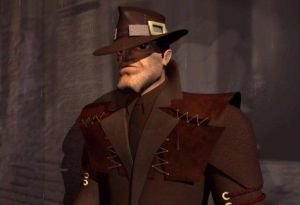 |
Lewton was voiced by Rob Brydon, as were Vimes, Nobby and several other characters during long days in the recording studio |
Chris: I adored working with Robert Lewellyn, and yes, his Butler was superb, and my favourite of the voice performances. He also laughed at my jokes, which was great. I had a running tally of the number of jokes in the script that cracked up the voice talent, because some were mine and some were edited in by Terry. I don't remember who won, but it was fun 'keeping score."
I also adored working with Kate Robbins, who voiced all the female characters. Her Carlotta makes the game, but it was her performance of the troll torch singer Sapphire that most bedazzled me. She came in and performed the song (written by Paul Weir) from the sheet music in one take. I was gobsmacked – what a pro!
Stefan: Kudos goes to the music in Noir. Again, very different from the games that came before. Not only that, there’s something very unique about many of the pieces compared to just about any other music I’ve heard in films, television or other games.
Chris: Paul did the entire score, and it was a work of genius. It draws against film noir orchestration with a healthy influence from jazz. There were two songs, and I co-wrote one of those with Paul, which was good fun. We worked together again on Ghost Master (another genius project spearheaded by Gregg), which also has an inventive score. It was one of the first games with fully dynamic music too.
Honestly, we had an amazing music department at Perfect – the head of audio, Rob Lord, was a session musician with Michael Jackson at one point; that's the calibre of talent we're dealing with. Rob and another of our musicians, Mark Bandola, supported The Crazy World of Arthur Brown at the ICA [Institute of Contemporary Arts] one night while I was working on Noir. That was an amazing gig!
Stefan: This is a question regarding all three entries: How enthusiastic were the voice actors for the games? How much input did they have into the portrayals, particularly characters directly from the books? Did they have the freedom to experiment lines and voice styles, or did they (and you) have to stick to very strict conditions? I ask this partly because, these being comedy games, the delivery of jokes and puns is paramount above just about all else. That, and I’m just nosey.
Chris: I can only speak to Noir's recordings, but there was a definite process we were following, under the expert command of Rob, who did all the studio recordings for all the games. I voice directed, but Rob was in charge of the show.
First, we'd get the talent comfortable in the booth. Sometimes that was trivial – Kate was in and away like she did it every day (which she more or less does!); Nigel Slater took a long time to satisfy himself that everything was in order. It was exacting, but it saves time in the long run as there were almost no retakes for microphone pop and so forth in his sessions. Once they were settled, we'd try on a few voices. It was a collaborative process deciding which way to go in that regard. Once we'd got the voice, we launched into the lines. I'd occasionally call a retake because of an issue with emphasis, and Rob would sometimes need a second take for technical reasons, but once we got rolling it was smooth.
But I feel for Rob Brydon. Every other voice performer was in for one day; Rob's script took five days. And it was hard work too... There's some dramatic lines for Lewton, but there's a lot of boring nuts-and-bolts, too. To make it worse, the script export had accidentally duplicated some lines for each place they appeared. The line "Sometimes a door is just a door" came up so often I swear Rob was ready to knife me in the chest by the final day of recording!
Stefan: There were a few famous or semi-famous names attached to the voice cast for the three games. Did you ever find yourself star struck at any point?
Chris: Star struck? No, not really. I don't think I appreciated at the time how lucky I was to be working with such amazing talent. It was just business as usual! What did I know? I was so early in my career at that point, I had no idea how lucky I was!
Stefan: Whilst the first two games liberally borrow plot elements from the books, Noir is its own original creation (references to noir film culture notwithstanding). Did this affect your approach of how you developed the story?
Chris: Absolutely! I was given a lot of rope and I played it all out before Greg reeled me back in. But it was a very careful process of composition, because I had to be true to all the different layers of source materials – Discworld and the fantasy megatext it draws against on the one hand, film noir and the hard-boiled novels they draw against on the other. I was threading a needle... and I would have been devastated if I couldn't get it at a comfortable balance between the two sides. But Discworld is a wonderfully absorbent setting – it can take tremendous abuse and still keep ticking!
Stefan: Was it more difficult to effectively start from scratch, or did you find the freedom of creating scenarios and more original characters than previous titles a breath of fresh air?
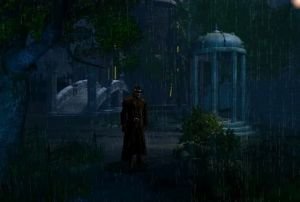 |
It only took Chris a month to write the script for Discworld Noir, but more than a year in preparing beforehand |
Chris: Well, I was never starting from scratch, because there is a shape to a hard-boiled detective story and there is a tone to a Discworld story so I wasn't starting from nowhere. Honestly, I was channelling a process and watching it develop through my work, and that of the incredible team at Perfect. There was never a point that I felt what I was doing was difficult... which isn't to say it was easy. But I'd spent more than a year preparing. By the time we got going, I just let it sweep me along!
Stefan: Getting into the thick of the story; whilst Noir takes pages, quite literally, from narratives of various films (lovingly), the plot is very detailed and elaborate and creative in its own right. How long did it take to write up the entire script? Considering you had to take into account references to films AND combine a dense level of Discworld lore, all whilst keeping things knee-deep in humour, were there any issues or hurdles during the writing process?
Chris: I'm not sure how long narrative design took; that was a process with a lot of discussions between myself and Greg. But I can tell you exactly how long it took me to write the script: one month. I had a laptop and I worked ten or twelve hours a day, cranking out page after page based on the narrative design. I couldn't tell you anything that happened that month that wasn't the script. And then it was done, and it was just a matter of waiting for Terry to edit it.
Stefan: How did it become to be a detective game? Was it a slow transition away from pure fantasy, or did you decide very early? I read the initial idea was to base the game on an assassin from one of the books?
Chris: Yes, I had surveyed Discworld fans who wanted a Teppic game. So I designed one. Gregg came down hard on me about that and put me in my place, because I had gone off half-cocked on that one. We scrapped the whole thing and made Noir, which was totally Gregg's concept (and was far better than what I'd sketched!) but he let me do all the work constructing the story. He managed me, guided me in precise ways, but gave me tremendous creative freedom. I learned an immense amount working with him. He was very much my mentor.
Stefan: The puzzle design between each instalment in the series was different. The first being brutally hard, the second being on the easier and arguably more logical side (or as logical as one could expect from Discworld), whilst Noir took a completely different approach with a much larger emphasis on the notebook clues and dialogue, much less in the way of item-based puzzles. Whilst we can easily deduce a lot of this was due to the nature of it being a detective story, were there any other forces at play that had you choose to make the puzzles and gameplay more dialogue-based?
Chris: It was my design. The first game had evil puzzles because Gregg is Satan himself when it comes to puzzle design. So many players bled from the ears trying to solve the first game that Gregg took mercy upon us for number two. My first task at Perfect was to completely play through the original Discworld, then as an encore I had to help them complete making Discworld II.... and having done so, I really didn't want to do more insane object puzzles. I wanted something completely different, and the hard-boiled detective was tailor-made for doing so.
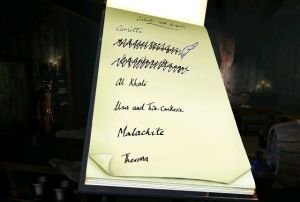 |
The notebook became an integral part of Discworld Noir's puzzles |
I designed the notebook, which is (I think) the first hypertext inventory in games – although most players may not realise it. Gregg made the decision to favour visual presentation over useability, so it didn't show you which were 'hyperclues' (that you could click through) and which weren't. I still use the notebook and the dialogue engine that goes with it in my narrative design classes at LCAD [Laguna College of Art and Design], and have done at the University of Bolton. I'm very proud of the design work I did on that game. It was entirely original but it felt familiar. That is not that easy to achieve.
However, Gregg was very exacting on my puzzle design – a harsh taskmaster in that regard. Key puzzles (like murder solutions) were revised again and again to ensure they were challenging enough. I was more interested in making the narrative as dynamic as possible – every plausible way a clue could have been encountered was supported. There were even some solutions I didn't even realise were possible, which I love about the game.
Stefan: What are your general thoughts now about the puzzles in all three games? For example, do you reflect upon them being too difficult or obtuse, or proud of having made games that, whilst hard, were more on the creative side than most stuff made nowadays?
Chris: I never liked working on puzzles, to be honest. It was some of the toughest work I did producing puzzles for Gregg, and like the kid who’s caught smoking and made to smoke a whole carton, I can't face playing games with puzzles in them now. I have a lot of respect for great puzzle design, but it's not my strength as a designer and I have lost my taste for it as a player. I'm glad I did it though... I learned so much from Gregg on the two Discworld games I worked on.
Stefan: Whilst Noir wasn’t as devilish as the first Discworld, it still has its share of obtuse puzzles. I could name a few examples, but I’m sure you know. In hindsight, would you have constructed any puzzles differently?
Chris: Gregg is a demon in human form. He was determined that you should suffer. Blame him!
Stefan: I found what I think was a small Easter egg in Noir. If you complete the game at least once, and then play through the game again, every time you click on a location on the map screen, you’re greeted with a high-pitched ‘Righty ho!’ soundbite.
Chris: Ha! I did not know that. I wonder if that was intentional? If it's a bug, it's a very weird one!
Stefan: Were there any other Easter eggs hidden away in Noir that you can remember?
Chris: Yes, I think so... But boy, I don't remember what. I'm sure the lead programmer, Mark Judge, had hidden something in there. Maybe it was the Easter egg you found!
Stefan: I hate myself for asking this, but… the first two titles are a little infamous for secretly including a rather naughty word, which at some point allegedly resulted in some trouble, maybe even from a legal perspective. Did anyone ever suggest secretly including a naughty word in Noir?
Chris: No, I can't say that was ever on the table!
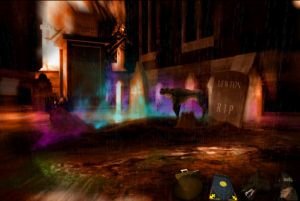 |
Some of Discworld Noir is spent playing a werewolf, offering a much different gameplay experience |
Stefan: Noir revels in its Discworld lore. Perhaps more than the two previous games. Personally, I’m eternally thankful as someone who was already a fan of the books – the game was a dream come true. But I could see how some elements, such as the colour coding scents when playing a werewolf in the latter half of the game, may have come off as somewhat confusing for those unfamiliar with Pratchett’s work. Was there ever a fear that the game would be a little too niche if it stuck too closely to Discworld mythology? Did you have to make any concessions? Did it cause complications as to how the game was made or how it should have been marketed?
Chris: Absolutely not! We were counting on this game appealing to Discworld fans, and knew that adventure gamers could handle anything we threw at them so there was no need to dumb it down for them. Everyone had absolute confidence in the canonical Discworldyness of it all.
Stefan: While on the subject, becoming a werewolf in the second half of the game turned an already fairly unique adventure into a complete game-changer. But it also must’ve made the game a whole lot more complicated to plan and program for.
Chris: Oh my goodness yes! I'm so glad Gregg liked that idea and he backed it to the hilt. But as I already mentioned, an animated Lewton-wolf was not feasible on our rather meagre budget so a clever compromise was devised: the first-person view. That conceit made my werewolf idea work, and I'm pretty sure Gregg made that suggestion.
Stefan: You mentioned reading as much as 75% of all the Discworld books. No easy feat considering how many of them there were, even at that point. Did you continue reading Discworld after the final game? What’s your favourite book?
Chris: I actually have read very little fiction at all after Noir because I picked up, as Mr Scoplett says in Noir, "a bad case of philosophy..." Reading philosophy completely supplanted fiction for me – at least until I had kids to read to. I can't wait for them to be old enough to read Discworld books too... what a treat that will be!
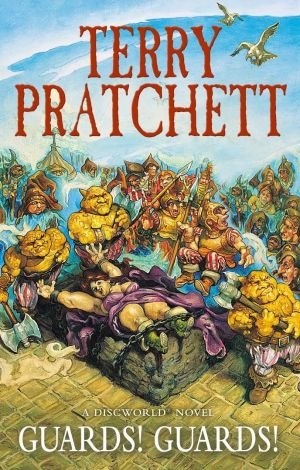 |
Guards! Guards! is perhaps Bateman's favourite Pratchett book, given its focus on the Ankh-Morpork City Watch |
As for my favourite, it might be Guards! Guards!, although I think Feet of Clay (which came out during my work on Noir) might be a more sophisticated novel. I also like Pyramids and Reaper Man, but the Watch are the stars of Ankh-Morpork for me, and the city is the crown of the Discworld series. That it draws against Leiber's Lankhmar is the icing of the cake. (Terry liked to downplay the influence of Leiber's Death on his own version at times... But it's hardly a secret that he was inspired by those books, nor that he took it far further than Leiber.)
Stefan: Do you still have any assets from the games, such as concept art, pictures, or earlier builds? If not, do you know if they still exist and where they might be?
Chris: Sadly, I don't think I do. I wish I did. I bet there's still some stuff out there – John Young, who lead the PlayStation team, may still have some. That said, I have files in deep storage... There might just be Discworld sketches in one of them. You never know – I am a hoarder!
Stefan: At the time you were making the Discworld games, how much of a fan were you and the rest of Perfect Entertainment of adventure games? Did you create the Discworld games as adventures because it was the genre you loved and wanted to work in? Was it because you were required to make them in that genre, or thought it was the genre best suited for a Discworld game?
Chris: It was a genre with a strong market throughout the nineties and it was a genre that thrived off a big art team and a small programming team, which was a practical set of resources to set up. I think Gregg had a deep love of the form too – one of his first games was a port of The Hobbit for Melbourne House. But 1996 changed games forever, and the point-and-clicks were on borrowed time from that point onwards. The writing was on the wall...
Stefan: Outside of your own creations, do you have any personal favourite adventure games? Furthermore, did any other adventures influence the design of your Discworld games? Were you / are you a fan of point-and-click adventures?
Chris: As part of the research, I played a good number of point-and-clicks. I remember enjoying the narrative work in both The Dig (LucasArts) and Broken Sword, which was made by the other British point-and-click developer, Charles Cecil's Revolution Software. I was less impressed by the structural design, and that might have influenced me to push harder on that side of Noir's narrative design. And there was a puzzle I really hated in Broken Sword: the goat. Man, that annoyed me.
But my favourite adventures were in the 16- and 8-bit eras, immediately before the first PlayStation. Magnetic Scrolls' Guild of Thieves has some soft non-linearity that I adored – you had to loot everything of value, but it was all more-or-less available to do in parallel. I think Angela was working for Rainbird, who published that classic. But nothing tops Mike Singleton's 1984 masterpiece Lords of Midnight, which was an adventure game and a strategy game in parallel. The best Lord of the Rings game to not have the license, and one of the finest pieces of software engineering in the history of games. (British-made, I might add...)
Stefan: Noir was released during the downfall of the point-and-click genre, with several other companies going out of business or changing their business models for other, more lucrative genres. Do you think, had Perfect Entertainment survived, you’d have continued with adventure games, or do you think the company would have been tempted to switch focus like most others? Were you still interested in developing adventure games?
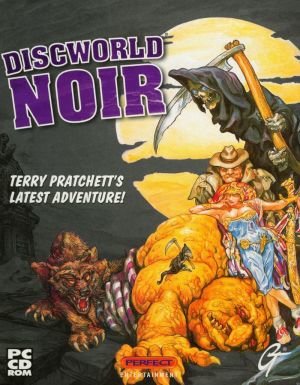 |
The timing was terrible for Discworld Noir's release, both for the company and the genre itself |
Chris: We were already trying to make the move away from adventures... There were two last projects of that kind: Space Babes and The Naked Gun (The Big Kahuna after we lost the license). Both had been cancelled before Noir shipped. Grim Fandango bombed, and that was it for adventures games.
I was working on two games in the last days of Perfect: World's Deadliest Chases, or some such, which was never completed, and Seven Shades, which was a fighting game with strategy-adventure elements. But by 2000, the ship was pretty much sunk, and there were no further releases.
Stefan: Just how financially successful were the three Discworld games? Presumably the first two enough to warrant sequels. Was there an increase or decline in sales in the second game? Understandably, there must have been a decline for the third, considering it wasn’t released in the US, but what about the regions it was released in? Did it sell at least reasonably well?
Chris: The first one sold very well – it was perfectly timed. The second was not as good, but it was good enough to warrant a sequel. I never saw sales figures for Noir... But the publisher was folding even during publishing it, and they did little to promote it because, well, it was already too late for the poor adventure. The 3D guns had arrived.
Stefan: What was your reaction to the critical response by review publications, gamers, and fans of the book series?
Chris: I was thrilled that it got such a great response – we won at least one Adventure of the Year award, which was amazing. And it means a lot to me that those who played it remember it fondly. I'm certainly proud of the work I did on it, and of everyone on the team.
Stefan: This may be a tough question to answer, but one that has played on the minds of many people who still fondly remember these titles: With the disappearance of Perfect Entertainment and GT Interactive, who actually owns the license to these games now?
Chris: Terry is the only person who could claim to own the license, although obviously that involves a certain complication. And he granted permission to the SCUMM VM project to make free adaptations of all of the games... Trouble is, that's a huge task – just doing one is an enormous challenge – so we may never see them.
Stefan: Apparently this is the reason why the games have never resurfaced on places such as GOG.com, etc.
Chris: Hypothetically, someone could try and push these games through a secondary channel like GOG, but if anyone challenged their rights claim, they would not be able to defend it. So it would be a risk, even to try...
Stefan: Experience-wise, what did you come away with from working on the Discworld games? Has it affected the games you’ve worked on since?
Chris: It totally changed my life. I wanted to make tabletop role-playing games, but by the ‘90s there was no hope of succeeding in that space. Discworld Noir linked me indelibly to game narrative, and that was how I founded International Hobo. If it wasn't for Noir, the entire fabric of my life would have to be rewoven.
Stefan: Can you briefly explain what your current company does?
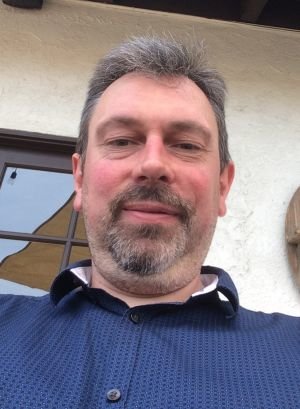 |
Chris now heads up his own company, International Hobo |
Chris: We work with developers to make their games more awesome, either by levelling up their game designs or by taking their narrative materials to a place they didn't even know was possible.
Stefan: My understanding of iHobo is that for the most part you cannot legally go into detail about what games you are involved in or have worked on in the past, but are you able to at least confirm whether or not you’ve worked on any adventure games since Discworld Noir?
Chris: I haven't worked on an adventure that was published since Noir. We tried to pitch some to publishers, but the offered budgets were too low so they didn't happen. Perhaps one day I'll try a Kickstarter for an adventure, but I don't really have a developer on hand to work on such a project and I wouldn't want to raise money without having that set up first.
Stefan: Imagine if, somehow, a company approached you to write and design another Discworld game, adventure or not. Would you say yes to such a thing?
Chris: Absolutely! I floated the idea of a Discworld RPG to Terry in the early 2000s, but he wasn't keen on doing another game project.
Stefan: The final question is, of course, do you have a message for the many fans of the Discworld games? There are still people such as myself who continue to play the titles, or have very fond memories.
Chris: I'm enormously grateful for the love the fans have shown the Discworld games, and Noir in particular as it was such a turning point in my career. To everyone who played Discworld Noir: thank you for being there to experience what we made, and thank you for remembering it.
INTERVIEWER'S NOTE: A big thank you to producer Patrick Hargreaves as representative and point of contact at iHobo.



